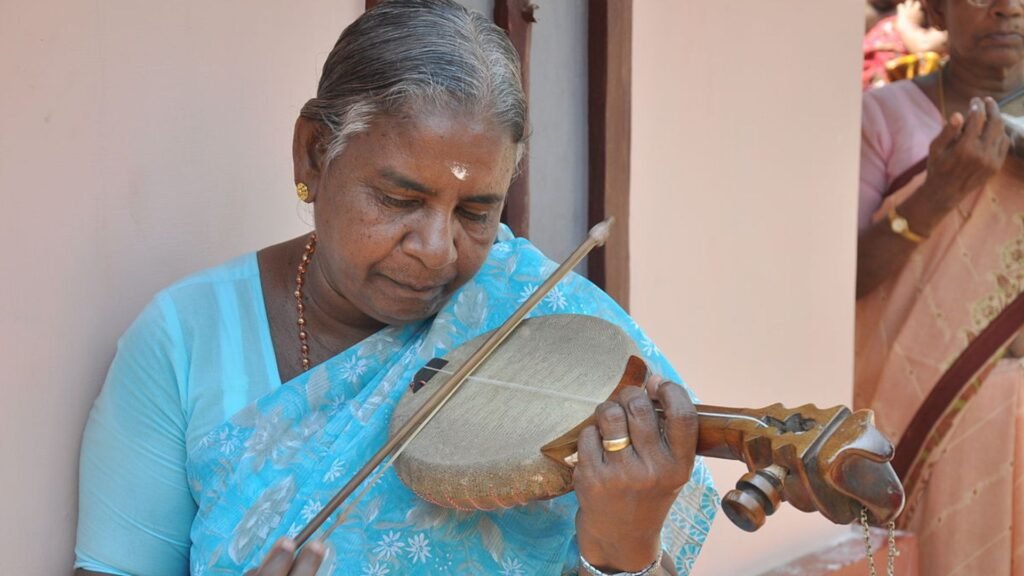Learning traditional Indian musical instruments can be a rewarding journey into a rich cultural heritage. These instruments, each with its unique sound and history, offer a deep connection to India’s musical traditions. Here’s a comprehensive guide on how to start learning these captivating instruments.
1. Choose Your Instrument
The first step in learning traditional Indian musical instruments is selecting the one that fascinates you the most. Indian music features a variety of instruments, such as the tabla, sitar, and flute. Each instrument has its distinct sound and playing technique. For instance, if you’re drawn to rhythmic patterns, you might start with the tabla. On the other hand, if melodic tunes are your preference, the sitar could be a great choice.

2. Find a Qualified Teacher
Once you’ve chosen an instrument, finding a qualified teacher is crucial. A knowledgeable instructor can guide you through the basics and advanced techniques of playing. Look for teachers who have experience with traditional Indian musical instruments and a teaching style that suits your learning needs. You can find teachers through music schools, online platforms, or local cultural organizations.
3. Start with the Basics
Before diving into complex pieces, focus on mastering the basics. This includes learning the fundamental techniques, hand positions, and scales associated with your chosen instrument. For example, with the sitar, you’ll begin by learning the basic strumming techniques and tuning the strings. Understanding these basics will build a strong foundation for more advanced learning.
4. Practice Regularly
Consistent practice is key to mastering traditional Indian musical instruments. Set aside dedicated time each day for practice, focusing on improving your skills and technique. Regular practice helps you develop muscle memory and familiarity with the instrument. For instance, if you’re learning the tabla, practice different rhythms and patterns daily to enhance your proficiency.
5. Listen to Master Performances
Listening to master performances is an excellent way to learn and get inspired. Listen to recordings of renowned musicians who excel in playing traditional Indian music instruments. Pay attention to their techniques, improvisations, and how they express emotions through their music. This exposure will deepen your understanding and appreciation of the instrument.
6. Study Music Theory
Understanding music theory is important for learning traditional Indian musical instruments. Study the basics of Indian music theory, including ragas (melodic frameworks) and talas (rhythmic cycles). This theoretical knowledge will help you interpret and perform music more effectively. For example, knowing the different ragas will allow you to play with a deeper sense of musicality.
7. Join a Music Group
Joining a music group or ensemble can enhance your learning experience. Playing with other musicians provides opportunities for collaboration and helps you develop a sense of timing and rhythm. Look for local music groups or online communities that focus on traditional Indian music instruments. This social interaction can be both motivating and educational.
8. Attend Workshops and Festivals
Workshops and music festivals are valuable resources for learning traditional Indian musical instruments. These events often feature performances and masterclasses by experienced musicians. Attending these events allows you to observe different playing styles and techniques, enriching your learning process.
9. Use Online Resources
Online resources can be incredibly helpful in learning traditional Indian musical instruments. Websites, video tutorials, and online courses offer valuable information and lessons. Platforms like YouTube have numerous tutorials on various instruments, allowing you to learn at your own pace. Utilize these resources to supplement your learning and practice.
10. Practice Patience
Learning traditional Indian musical instruments requires patience. Progress might be slow initially, but with persistence and dedication, you will improve over time. Embrace the learning process and enjoy the journey of mastering your instrument. Patience will help you overcome challenges and stay motivated.
11. Record and Review
Recording your practice sessions and reviewing them can provide valuable feedback. Listening to your recordings allows you to identify areas for improvement and track your progress. This self-assessment helps you refine your technique and enhance your overall performance.
12. Explore Different Styles
Indian music is diverse, and exploring different styles can broaden your understanding of traditional instruments. Experiment with various genres and techniques to find what resonates with you. For instance, you might explore classical, folk, or devotional styles of music on your instrument.
13. Connect with the Culture
Connecting with the cultural context of traditional Indian music instruments enriches your learning experience. Learn about the history, traditions, and significance of the instrument in Indian culture. Understanding these aspects will deepen your appreciation and connection to the music you play.
14. Seek Feedback from Peers
Receiving feedback from peers and other musicians can provide valuable insights into your playing. Share your performances with friends, family, or fellow musicians and ask for constructive criticism. This feedback helps you refine your skills and gain different perspectives.
15. Stay Inspired
Finally, stay inspired by continuously exploring new music and learning opportunities. Keep listening to great performances, attending events, and practising regularly. Your enthusiasm and passion for traditional Indian music instruments will drive your progress and make the learning process enjoyable.
Conclusion
Learning traditional Indian music instruments is a fulfilling journey that connects you to a rich cultural heritage. By choosing the right instrument, finding a qualified teacher, and practising regularly, you can develop your skills and appreciation for Indian music. Embrace the learning process, stay patient, and enjoy the beauty of traditional Indian music.

